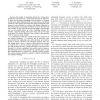Free Online Productivity Tools
i2Speak
i2Symbol
i2OCR
iTex2Img
iWeb2Print
iWeb2Shot
i2Type
iPdf2Split
iPdf2Merge
i2Bopomofo
i2Arabic
i2Style
i2Image
i2PDF
iLatex2Rtf
Sci2ools
106
click to vote
INFOCOM
2009
IEEE
2009
IEEE
Mobility-Driven Scheduling in Wireless Networks
—The design of scheduling policies for wireless data systems has been driven by a compromise between the objectives of high overall system throughput and the degree of fairness among users, while exploiting multi-user diversity, i.e., fast-fading variations. These policies have been thoroughly investigated in the absence of user mobility, i.e., without slow fading variations. In the present paper, we examine the impact of intra- and inter-cell user mobility on the trade-off between throughput and fairness, and on the suitable choice of α-fair scheduling policies. We consider a dynamic setting where users come and go over time as governed by random finite-size data transfers, and explicitly allow for users to roam around. It is demonstrated that the overall performance improves as the fairness parameter α is reduced, and in particular, that proportional fair scheduling may yield relatively poor performance, in sharp contrast to the standard scenario with only fast fading. Since a l...
Related Content
| Added | 24 May 2010 |
| Updated | 24 May 2010 |
| Type | Conference |
| Year | 2009 |
| Where | INFOCOM |
| Authors | Sem C. Borst, Nidhi Hegde, Alexandre Proutiere |
Comments (0)

